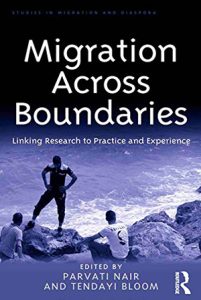Migration Across Boundaries: Linking Research to Practice and Experience

Editor(s): Parvati Nair & Tendayi Bloom
Publisher: Routledge
Year of Publication: 2015
Print Length: 222 pages
Genre: Academic / Metholodogy and Methods, Non-Fiction / Migration & Refugee Studies, Social Science
Area: Including The United Kingdom (UK), France
People: Palestinian
Topic: Research, Research Methods, Interdisciplinary Research, Qualitative Research, Bottom-Up Research, Lived Experience, Policy & Practice, Migration, Migrants, Refugees & Forced Migration, Asylum & Asylum Seekers, Mobility & Immobility, Ethics & Morality, Borders, Good/Best Practice, Transnationalism, Identity, Justice, Destitution, Survival, Resilience, Resistance; Memory, Remembering and Forgetting; Citizenship, Family, Storytelling, Psychiatry, City & Urban, Everyday Life, Photography, Hospitality
Bringing together scholars and practitioners from a range of disciplinary backgrounds working in Europe, North and South America, South Asia and the Middle East, this volume explores the question of how to ensure that migration research feeds back into improving the lives of migrants. It emphasises the necessarily interdisciplinary and cross-boundary nature of migration research, offering methodological recommendations to anyone studying or working in the field, and showing how migration studies can usefully affect real contexts by better exploring the potential that exists for both bridging academic disciplines and building links with work that occurs beyond strictly academic forums.
Organised around the themes of methodological considerations and interdisciplinary approaches, the experiences of migrants as researchers and interaction between practitioners, policy-makers and academics, Migration Across Boundaries discusses the realities of the discourses that surround international migration, examining the proper role of academia in bringing together a range of stakeholders to formulate dialogic approaches to understanding migration. An international and interdisciplinary contribution to our understanding of how research in migration can be brought to bear on the experiences of migrants and linked to the work of activists, artists and policy-makers, this book will appeal not only to scholars and students of migration across the social sciences, but also to those working in the fields of migrant advocacy and activism.
Table of Contents
List of Figures
Notes on Contributors
Acknowledgements
Series Editor’s Preface
Introduction — Parvati Nair and Tendayi Bloom
1. On the Border: Framing Migration Interconnectivity between States and Societies as Diaspora or Transnationalism? A Response Formulated through Interdisciplinary Lenses — Valeria Bello
2. Method in the Chaos: Non-Linearity, Ephemerality and Refugee Identity — Suda Perera
3. Composing Theories of Justice in an Unjust World: Using a Methodology of Interdisciplinary Iterative Analysis to Examine the UK Policy of Destitution of Refused Asylum Seekers — Tendayi Bloom
4. Paris 19: Mobility, Memory and Migration — Andrés Borda-Gonzáles, David Kendall, Abbas Nokhasteh, Moustafa Traoré
5. Sketches from the Margins of Marginalized Communities: Lessons in Survival, Resilience and Resistance Acquired from Palestinian Refugees — John Halaka
6. Citizenship Narrated: A Cross-Disciplinary Study of Family Migration and Storytelling — Rikke Wagner
7. Interdisciplinary at Work: Ethnopsychiatry, Migration and the Global Subject — Francesco Vacchiano
8. Cities as Lived Spaces: Making Sense of Everyday Migrant Sociability in Academic Discourses on Migration and Cities — Megha Amrith
9. Still Photography and Moving Subjects: Migration in the Frame of Hospitality — Parvati Nair

Parvati Nair is Professor of Hispanic, Cultural and Migration Studies at Queen Mary University of London, engaging in research and doctoral supervision. She is also currently Head of the School of Languages, Linguistics and Film. She joined United Nations University (UNU) in 2012 to found and direct the United Nations University Institute on Globalization, Culture and Mobility (UNU-GCM), based in Barcelona. Her interests lie in the dynamics of migration at grass-roots level, in the intersections of the global and the local through migration, as well as in the ways in which borders function as points of contact, passage and obstruction. Her work aims to construct a better understanding of how policies and practices shape one another, affecting both the ways in which migrants, refugees and strangers may relocate and how communities, localities and places evolve through the movements and weaves of people. She is also the founder and Principal Editor of Crossings: Journal of Migration and Culture.
Source: https://www.parvatinair.com/about/
More from Parvati Nair in this library, click here.

Tendayi Bloom is a Political and Legal Theorist who is interested in questions of noncitizenship, statelessness, and human mobility. She is Associate Professor at Department of Political Science and International Studies, University of Birmingham. Her current work explores these themes in the context of Global Migration Governance. She is author of Noncitizen Power: Agency and the Politics of Migration (Bloomsbury, 2023) and Noncitizenism: Recognising Noncitizen Capabilities in a World of Citizens (Routledge, 2018). She is co-editor most recently of Statelessness, Governance, and the Problem of Citizenship (Manchester University Press, 2021) and Understanding Statelessness (Routledge, 2017). She also writes a range of academic articles and policy documents. Downloadable versions of most of her publications are available from her academia profile. She is currently researching aspects of noncitizenship in global governance and implications of theoretical noncitizenism for understandings of citizenship.
Source: https://www.birmingham.ac.uk/staff/profiles/gov/bloom-tendayi.aspx
More from Tendayi Bloom in this library, click here.
